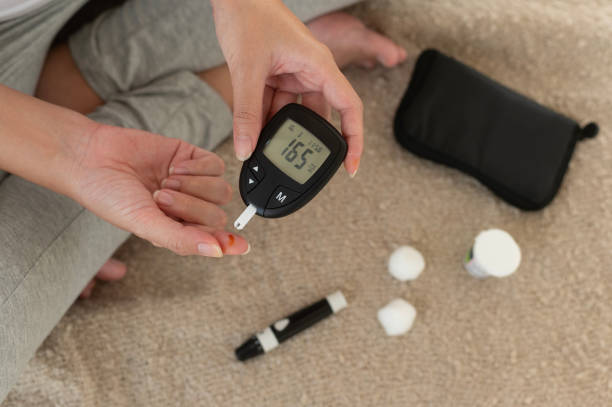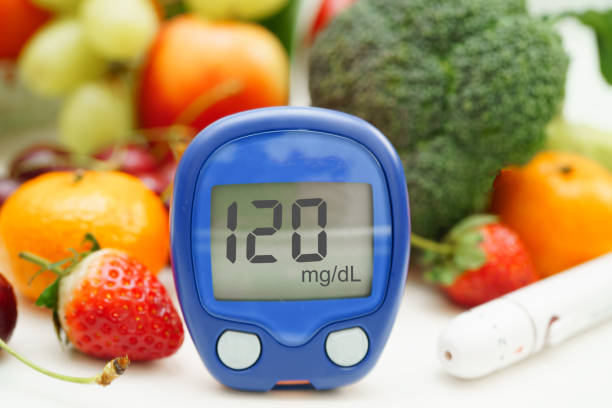Managing high blood sugar is very important for your overall health, especially if you have diabetes or are at risk of developing it. The good news is that you can lower your blood sugar naturally by making simple, smart lifestyle changes.
In this post, you’ll find easy and proven tips that can help reduce your blood sugar levels. With these steps, you can take control of your health and feel better one day at a time.
What Is Blood Sugar and Why Does It Matter?
Blood sugar, also known as glucose, is the main type of sugar in your blood. Your body uses it as a key source of energy. However, when blood sugar levels rise too high, it can cause health problems. Over time, consistently high blood sugar may lead to serious conditions like:
- Type 2 diabetes
- Heart disease
- Nerve damage
- Kidney disease
- Vision problems, including vision loss
Keeping your blood sugar within a healthy range is one of the best ways to protect your body and maintain good health.

1. Eat a Balanced, Low-Sugar Diet
What you eat plays a huge role in controlling your blood sugar levels—more than most other factors. Eating too many sugary or processed foods can cause your blood sugar to spike quickly. To keep your blood sugar steady and healthy, focus on a balanced diet that includes:
High-Fiber Foods
Fiber plays a key role in slowing down how quickly sugar enters your bloodstream. This helps keep your blood sugar levels steady. Adding more fiber to your diet is a smart and natural way to support better blood sugar control. Some great high-fiber foods include:
- Oats
- Lentils
- Beans
- Chia seeds
- Leafy greens
Eating these foods regularly can help you feel full longer and improve your overall health.
Healthy Carbs
Not all carbs are the same. Choosing healthy, whole-grain carbs instead of refined carbs can help keep your blood sugar stable. These carbs break down more slowly and provide lasting energy. Good examples of healthy carbs include:
- Brown rice
- Quinoa
- Sweet potatoes
- Whole wheat bread
Adding these to your meals can help you feel full and support better blood sugar control.
Lean Proteins and Healthy Fats
Lean proteins and healthy fats help keep you full longer and can cut down on sugar cravings. They also give your body the nutrients it needs without spiking blood sugar. Try adding these to your diet:
- Chicken or turkey
- Eggs
- Nuts and seeds
- Avocados
- Olive oil
Eating a mix of these foods can support steady energy and better blood sugar control throughout the day.
Tip: Eating smaller meals more often during the day can help keep your blood sugar steady. This prevents large spikes and crashes that can make you feel tired or hungry soon after eating.
2. Exercise Regularly to Lower Blood Sugar
Physical activity helps your body use insulin better. When you move your muscles, they absorb more sugar from your blood. This process helps lower your blood sugar levels and keeps them more stable.
Best Exercises to Lower Blood Sugar
- Walking: A simple 30-minute walk each day can help reduce blood sugar.
- Strength training: Lifting weights or using resistance bands can improve how your body uses insulin.
- Yoga or stretching: These gentle activities help lower stress and boost blood flow.
According to the Centers for Disease Control and Prevention (CDC), regular exercise can lower your A1C—a key measure of your average blood sugar over time.
3. Manage Stress to Improve Blood Sugar Control
Stress can raise your blood sugar levels. When you feel stressed, your body releases hormones such as cortisol that cause blood sugar to increase. Managing stress well is key to keeping your blood sugar steady and protecting your overall health.
Easy Ways to Manage Stress
- Deep breathing exercises
- Meditation or prayer
- Writing in a journal
- Listening to calming music
- Spending time outdoors in nature
Taking just a few minutes each day to relax and calm your mind can help lower your blood sugar and improve your overall well-being.
4. Get Enough Quality Sleep
Poor sleep can make it harder for your body to use insulin properly. When you don’t get enough rest, your blood sugar levels may rise. That’s why getting enough sleep is important for blood sugar control. Aim for 7 to 9 hours of quality sleep each night to support your overall health and keep your blood sugar in a healthy range.
Tips for Better Sleep
- Go to bed and wake up at the same time every day
- Avoid using screens like phones or computers before bedtime
- Keep your bedroom cool, quiet, and dark
- Skip caffeine in the afternoon and evening
The National Sleep Foundation explains that good sleep is essential for managing blood sugar and supporting overall health.
5. Stay Hydrated
Drinking plenty of water helps your body flush out extra sugar through urine. Staying well-hydrated also keeps your kidneys working properly. Healthy kidneys filter your blood and remove waste, which is important for maintaining good blood sugar levels and overall health.
Healthy Drink Choices
Choosing the right drinks can help keep your blood sugar steady. Here are some healthy options to try:
- Water (add lemon or cucumber slices for extra flavor)
- Herbal tea
- Sparkling water with no added sugar
Be sure to avoid sugary drinks like soda and sweet tea, as they can cause quick spikes in your blood sugar levels.

6. Monitor Your Blood Sugar Levels
Keeping track of your blood sugar numbers helps you understand what works best for your body. You can use a home glucose monitor or a continuous glucose monitor (CGM) if your doctor recommends it.
Why It Matters
- You can spot high blood sugar early before it causes problems
- You’ll learn how different foods and exercises affect your blood sugar
- You can share accurate data with your doctor to get better advice
Monitoring your numbers regularly gives you more control over your health and helps you make smart choices every day.
7. Eat Foods That Help Lower Blood Sugar
Some foods are especially helpful for keeping blood sugar levels steady. Try adding these to your meals:
- Cinnamon: May help improve how your body uses insulin.
- Apple cider vinegar: Can reduce blood sugar spikes after eating.
- Leafy greens: Low in carbohydrates and packed with important nutrients.
- Nuts: Help slow down how fast sugar enters your bloodstream.
- Berries: Lower in sugar and high in fiber, making them a great sweet choice.
According to Harvard Health, including these foods in your diet can support better blood sugar control and overall health.
8. Lose Extra Weight If Needed
Even losing a small amount of weight can help improve your blood sugar levels. Shedding just 5 to 10% of your body weight can have a big positive impact on your health and blood sugar control.
Ways to Lose Weight Safely
- Choose whole, natural foods instead of processed options
- Stay active with regular exercise you enjoy
- Drink plenty of water throughout the day
- Make sure to get enough restful sleep each night
Remember, weight loss isn’t just about appearance—it’s about improving your overall health and keeping your blood sugar under control.
9. Avoid Sugar-Sweetened Foods and Drinks
Foods with added sugar cause your blood sugar to rise quickly and offer very little nutritional value. These foods can lead to energy crashes and make it harder to manage your blood sugar.
Common Foods to Limit
- Sodas and other sugary drinks
- Candy and sweet baked goods
- Sweetened cereals
- Fast food and fried items
Always check food labels for “added sugars.” The less added sugar you eat, the better it is for your blood sugar and overall health!
10. Talk to Your Doctor About Supplements
Some natural supplements might help support healthy blood sugar levels. However, it’s important to talk with your doctor before trying any supplements, especially if you take medications, to avoid any risks or interactions.
Popular Supplement Options
- Berberine
- Magnesium
- Chromium
- Alpha-lipoic acid
The National Institutes of Health (NIH) offers reliable information about these supplements and how they may affect blood sugar levels. Always consult your healthcare provider before starting any new supplement.

Bonus Tip: Eat More Mindfully
Slowing down and practicing mindful eating can help you avoid overeating and prevent sudden spikes in blood sugar. When you focus on your meals and eat without distractions, your body can better recognize when it’s full. This helps support healthier blood sugar levels and improves digestion.
How to Practice Mindful Eating
- Put your phone and other distractions away during meals
- Chew your food slowly and savor each bite
- Pay close attention to your body’s signals for hunger and fullness
Practicing mindful eating can help you better control your portions and keep your blood sugar steady.
Final Thoughts: Small Changes, Big Results
Reducing blood sugar doesn’t have to be difficult. By making small, healthy choices each day—such as eating nutritious foods, staying active, and getting enough sleep—you can take control of your health and start feeling better quickly.
Remember:
Every small step you take can make a big difference. Begin with one or two simple changes, and gradually add more over time. Stay positive—you’re capable of managing your blood sugar and improving your health!

